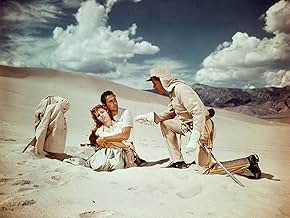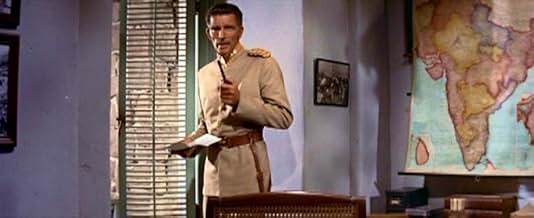En la India del siglo XIX, un oficial británico de casta mixta lucha contra los prejuicios de sus compañeros en el ejército y de la población local a la vez que intentan apagar una rebelión ... Leer todoEn la India del siglo XIX, un oficial británico de casta mixta lucha contra los prejuicios de sus compañeros en el ejército y de la población local a la vez que intentan apagar una rebelión liderada por un político avaricioso.En la India del siglo XIX, un oficial británico de casta mixta lucha contra los prejuicios de sus compañeros en el ejército y de la población local a la vez que intentan apagar una rebelión liderada por un político avaricioso.
- Dirección
- Guionistas
- Elenco
- Premios
- 1 nominación en total
- Ali Nur
- (as Frank de Kova)
- Native Dancer
- (as Sujata)
- Servant
- (sin créditos)
- Bit Role
- (sin créditos)
- Afridi Horseman
- (sin créditos)
- Soldier
- (sin créditos)
- Afridi Horseman
- (sin créditos)
- Hamid Bahri
- (sin créditos)
- Singer
- (sin créditos)
Opiniones destacadas
This was also the ninth of eleven films Power did with director Henry King and they rate right up there with John Wayne-John Ford and Martin Scorsese-Robert DeNiro as a successful director/actor team. King directed Power's breakthrough film role in Lloyds of London and his collaborations with Power is some of the best work for either men.
I wouldn't rate King of the Khyber Rifles as one of the best for either man. Yet it's entertaining enough and full of enough action to satisfy those who crave it in their films.
Power plays a British Army captain of mixed racial parentage and religious background as his mother was Moslem. He encounters a lot of hostility from both sides, similar to what Ava Gardner faced in Bhowani Junction.
It turns out that the leader of the local rebels is his former childhood play mate and son of the Moslem cleric who took young Power in when he was orphaned. Guy Rolfe is the rebel chief and he's a cunning and vicious foe of the British occupation. Rolfe also did a superb job in Ivanhoe as King John and these two roles are probably his career parts. Rolfe's the best one in the film.
It might have been a bit better had someone other than Terry Moore played the daughter of the English colonel. Another reviewer says she comes off like a débutante and she really does. Michael Rennie as her father is a stalwart defender of the Empire.
King of the Khyber Rifles is decent enough entertainment, but it wasn't in any contention for any awards in 1953.
KING OF THE KHYBER RIFLES explores King's personal difficulties as he tries to find his own social position, living in uneasy suspension between the world of the native and the foreign sahibs, torn between them; only the adventurous experience can resolve his status. Prejudice against King emerges because of his parentage; fellow officers refuse to be billeted in the same quarters, and he is conspicuously not invited to the queen's birthday ball. The stress is not simply on his courage but more on the numerous challenges he must face in daily living. A social outcast at the fort, King is most secure in the home of his adopted father, Hamid Bahra, a Moslem holy man; the picture was originally to end with King returning to Bahra before joining Susan. KING OF THE KHYBER RIFLES has a lone hero and none of the emphasis on military camaraderie, or the careless, Boys' Own tone to be found in such films as GUNGA DIN. Authentic details of Indian atmosphere convey a sense of accuracy, such as the rumors that the cartridges for the new Enfield rifles are greased with pig's fat, simultaneously offending Moslem and Hindu alike. King must use his unique appeal as a fellow native to lead the Khyber Rifles in an attack on Khan's encampment. At the last moment, King's men resolve not to use the rifles but offer to follow him using their knives. The imperial conflict is between men who are sons of India, whether Kurram Khan and his followers or King and the Khyber Rifles. Yet KING OF THE KHYBER RIFLES ultimately evades the question of the desire for Indian independence, through depicting Kurram Khan's leadership as far more ruthless and dictatorial than British rule. King is in a unique position; his half-caste status, negotiating between British and Indian with a knowledge of both, enables a British victory, establishing not just his equality within the fort but also his eligibility to marry Susan. The British outpost offers the hero the only world where his merits can win recognition, partaking of both sides of his ancestry by following in his father's military footsteps. King's birthplace and home are India, not England, and though he may serve the British, he does so for the distinction such duty may bring through association with a respected unit like the Khyber Rifles. King secures greater respect than is accorded to white officers like Maitland. While utilizing many of the incidents and motifs of THE LIVES OF A BENGAL LANCER, THE CHARGE OF THE LIGHT BRIGADE, GUNGA DIN, and other such movies, KING OF THE KHYBER RIFLES also sums them up, providing both a commentary and a decisive new turn. KING OF THE KHYBER RIFLES brings Indians to the forefront, honoring the native traditions while still treating heroes and villains according to standardized genre patterns. While clearly an adventure of colonial India in the classical mode, KING OF THE KHYBER RIFLES represents a fundamental shift to an awareness of its own conventions, allowing the film to be watched today more easily than many other adventures of a similar vintage. KING OF THE KHYBER RIFLES was the fourth picture shot in Twentieth Century-Fox's new widescreen process, CinemaScope, and it was widely acclaimed as the the first picture whose action fully justified use of the anamorphic lens. Fox's directing "King" was assigned to it: Henry King, a sixty-seven year old veteran whose career stretched back to the teens, and was a personal favorite of Zanuck as well as a close friend of leading star Tyrone Power. Power, tired of playing action roles, disliked KING OF THE KHYBER RIFLES, and by then was more interested in unusual, challenging character roles. Unfortunately, Zanuck wanted to use Terry Moore, who was already under contract, as the leading lady, a role she sought assiduously despite being completely miscast in the part. Zanuck was enthusiastic about shooting KING OF THE KHYBER RIFLES in Lone Pine, and Henry King agreed that a location trip to India was unnecessary, and the California locale substituted so well that many reviewers believed that at least portions of the picture had been shot in India. Producer Frank Rosenberg selected Bernard Herrmann to write the score, hoping for and receiving something more exotic and less intrusive than the type of martial music Alfred Newman had written for previous Henry King-Tyrone Power adventure films at Fox. KING OF THE KHYBER RIFLES was widely touted as Fox's Christmas release, becoming a box-office hit, and it is still popular on television.
¿Sabías que…?
- TriviaTyrone Power was widely considered too old for his character, as well as unconvincing as an officer in the British army.
- ErroresCaptain King's pocket watch contains photographic images of his parents (~12:00) which must predate their stated 1833 date of death. The earliest known photograph of a person by Daguerre is from 1838 and were all exposed onto metallic silver plates.
- Citas
Brig. Gen. J. R. Maitland: You can't marry him Susan
Susan Maitland: Say what you're thinking Father!
Brig. Gen. J. R. Maitland: He's a half caste...
- ConexionesEdited into El tunel del tiempo: Night of the Long Knives (1966)
Selecciones populares
- How long is King of the Khyber Rifles?Con tecnología de Alexa
Detalles
- Fecha de lanzamiento
- País de origen
- Idiomas
- También se conoce como
- Der Hauptmann von Peshawar
- Locaciones de filmación
- Alabama Hills, Lone Pine, California, Estados Unidos(Khyber Pass)
- Productora
- Ver más créditos de la compañía en IMDbPro
Taquilla
- Presupuesto
- USD 2,190,000 (estimado)
- Tiempo de ejecución
- 1h 40min(100 min)
- Relación de aspecto
- 2.55 : 1





















